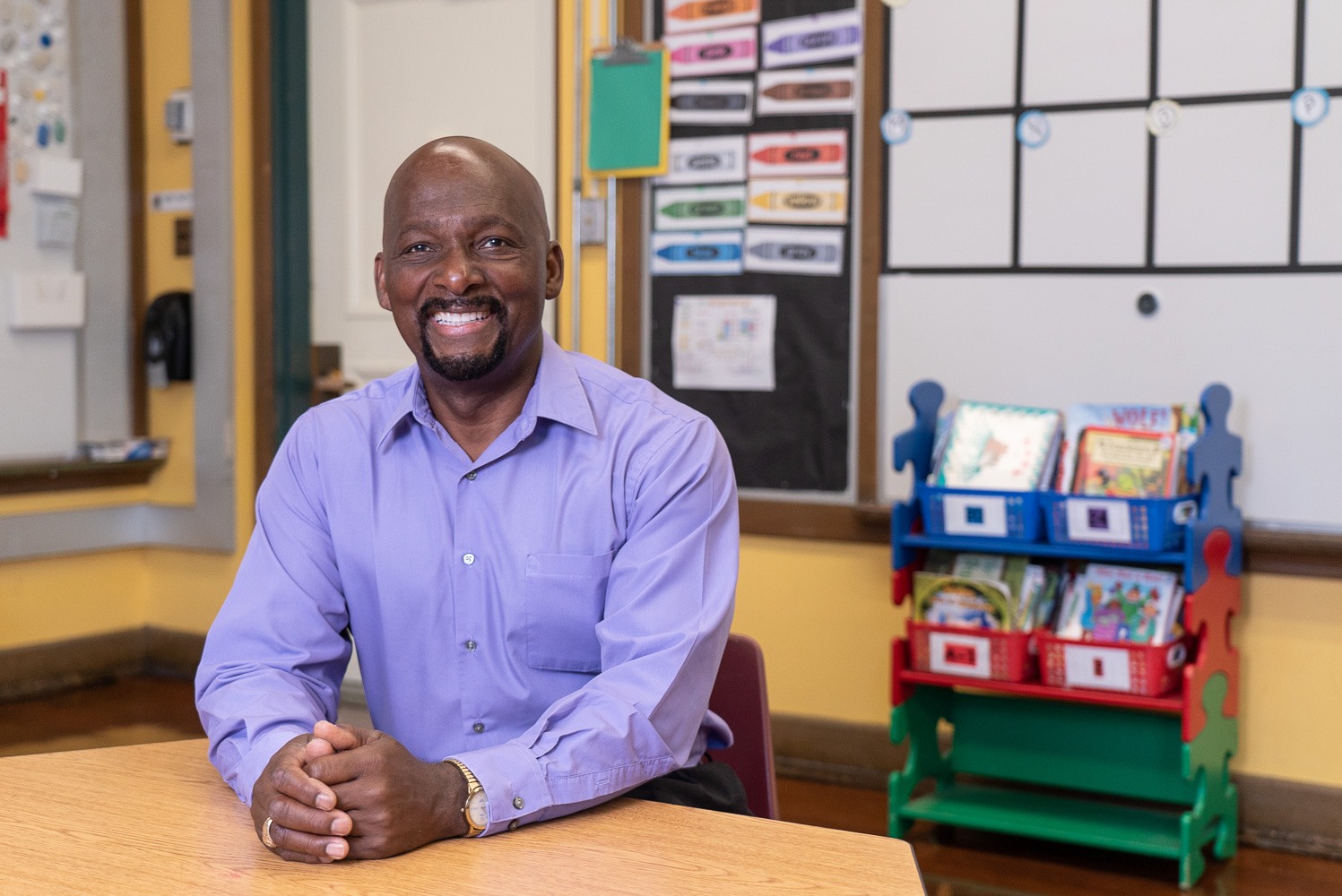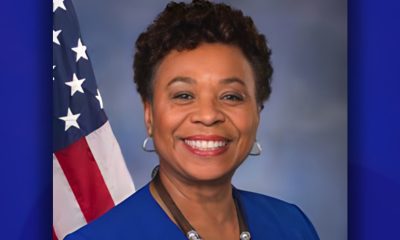Community
New School Board Will Grapple with Pandemic, OUSD’s Legacy of Distrust


Mike Hutchinson
Members of the school community are looking expectantly to January, when four new school board trustees take their seats, for signs that there will be new directions in Oakland public schools’ leadership.
The new board members – Dr. Clifford Thompson, Mike Hutchinson, VanCedric Williams and Sam Davis – will be called on to work with the other three members of the seven-member board to develop solutions in a district that faces deep divisions over school closings and austerity-driven budget cuts. At the same time, they must also find a path to reopen the city’s classrooms during the COVID-19 pandemic that currently requires the district to rely on Internet-based education.
The last few years were marked by intense conflict in Oakland schools. A bitter teachers’ strike filled the streets of Oakland daily with thousands of teachers and their supporters and was widely supported in the community. In the wake of the strike, the school board and the administration stuck by an unpopular decision to close two schools, Roots Academy and Kaiser Elementary. Distrust and anger at the board and administration grew red hot during the prolonged and desperate protests of the schools’ parents and supporters and may have been instrumental in the decisions of the four incumbent board members not to run for re-election this past November.
The Oakland Post spoke this week to the four new board members about their immediate plans and priorities for when they take office in January. Below are interviews with Dr. Thompson and Hutchinson. Next week, the Post will publish the interviews with Williams and Davis.
Dr. Thompson, who will represent District 7, works currently as a fifth-grade teacher in the West Contra Costa Unified School District. He has worked extensively in Oakland schools and has decades of experience as a teacher, principal, administrator and university professor.
He says his immediate goal is to help the schools recover from the pandemic.
“My top priority is getting the kids back to school, but I want to do it in a safe manner,” he said, emphasizing that he will rely on recommendations of the Centers for Disease Control and Prevention (CDC).
His education goals are to implement school board policies that promote neighborhood schools throughout the city and “disrupt the racism that exists” to create educational opportunity for all students.
Supporting neighborhood schools and increased equity will bring students back to the public schools, he said.
“I remember when Oakland public schools had 54,000 students. Now they have 36,000,” Thompson said. “I’m interested in getting those numbers up. We can do it if we concentrate on a high-quality program like we used to have. Kids will be clamoring to get in.”
Thompson was the only candidate elected to the board in November who was backed by GO Public Schools, a local pro-charter school organization with a lot of influence in the school district. He has worked as an administrator at both charters and public schools.
He says the public battle over the two types of schools misses the point. He does not see himself as someone who supports charters or traditional public schools but as a backer of schools “offering a quality education.”
“I am not a charter school advocate. I’m a solid program advocate,” he said. “I believe we should focus on whether what we are doing benefits students,” he said in an online interview. “Our goal, as educators, is to find what works and use it for our students and their learning.”
Mike Hutchinson, who will represent District 5, is a long-time school advocate who was born in Oakland and attended public schools in the city. He worked in the schools for 20 years until 2012 when the district closed the school where he was working.
He says he will work with the administration to create a post-pandemic reopening that has broad community, family and teacher support.
“Right now, there is not enough trust to create a reopening plan,” he said. “We need to create a process for people to buy in and engage in the plan.”
The district’s current plan is not bad, he said, “but lacks community involvement.” “That’s why there is so much lack of trust. There will be no reopening without a school board vote,” he said.
He says he also wants to strengthen the school board. “One of the changes I’m going to be pushing for is for the school board to assume its full authority,” he said.
He said he has had positive meetings with Supt. Kyla Johnson-Trammell and her staff. “I’m encouraged in meeting with the superintendent that she seemed very receptive to the board playing its (proper) role. It seems like she is ready to make some of these changes.”
The relationship between the board and the administration “has been out of balance since the state took over in 2003,” Hutchinson said. Administrators ran the district, and board members turn their authority over to the superintendent and staff. “(But) it is the board’s job to create policy and create betters schools,” he said.
The first policy change on his list is to modify the district’s Blueprint for Quality Schools to stop school closings.
“This is the policy of school closures and destabilization. I’m going to be eliminating school closures,” Hutchinson said.
Activism
Oakland Post: Week of April 24 – 30, 2024
The printed Weekly Edition of the Oakland Post: Week of April 24 – 30, 2024

To enlarge your view of this issue, use the slider, magnifying glass icon or full page icon in the lower right corner of the browser window. ![]()
Alameda County
DA Pamela Price Stands by Mom Who Lost Son to Gun Violence in Oakland
Last week, The Post published a photo showing Alameda County District Attorney Pamela Price with Carol Jones, whose son, Patrick DeMarco Scott, was gunned down by an unknown assailant in 2018.

Publisher’s note: Last week, The Post published a photo showing Alameda County District Attorney Pamela Price with Carol Jones, whose son, Patrick DeMarco Scott, was gunned down by an unknown assailant in 2018. The photo was too small for readers to see where the women were and what they were doing. Here we show Price and Jones as they complete a walk in memory of Scott. For more information and to contribute, please contact Carol Jones at 510-978-5517 at morefoundation.help@gmail.com. Courtesy photo.
City Government
Vallejo Welcomes Interim City Manager Beverli Marshall
At Tuesday night’s Council meeting, the Vallejo City Council appointed Beverli Marshall as the interim city manager. Her tenure in the City Manager’s Office began today, Wednesday, April 10. Mayor Robert McConnell praised Marshall’s extensive background, noting her “wide breadth of experience in many areas that will assist the City and its citizens in understanding the complexity of the many issues that must be solved” in Vallejo.

Special to The Post
At Tuesday night’s Council meeting, the Vallejo City Council appointed Beverli Marshall as the interim city manager. Her tenure in the City Manager’s Office began today, Wednesday, April 10.
Mayor Robert McConnell praised Marshall’s extensive background, noting her “wide breadth of experience in many areas that will assist the City and its citizens in understanding the complexity of the many issues that must be solved” in Vallejo.
Current City Manager Michael Malone, whose official departure is slated for April 18, expressed his well wishes. “I wish the City of Vallejo and Interim City Manager Marshall all the best in moving forward on the progress we’ve made to improve service to residents.” Malone expressed his hope that the staff and Council will work closely with ICM Marshall to “ensure success and prosperity for the City.”
According to the Vallejo Sun, Malone stepped into the role of interim city manager in 2021 and became permanent in 2022. Previously, Malone served as the city’s water director and decided to retire from city service e at the end of his contract which is April 18.
“I hope the excellent work of City staff will continue for years to come in Vallejo,” he said. “However, recent developments have led me to this decision to announce my retirement.”
When Malone was appointed, Vallejo was awash in scandals involving the housing division and the police department. A third of the city’s jobs went unfilled during most of his tenure, making for a rocky road for getting things done, the Vallejo Sun reported.
At last night’s council meeting, McConnell explained the selection process, highlighting the council’s confidence in achieving positive outcomes through a collaborative effort, and said this afternoon, “The Council is confident that by working closely together, positive results will be obtained.”
While the search for a permanent city manager is ongoing, an announcement is expected in the coming months.
On behalf of the City Council, Mayor McConnell extended gratitude to the staff, citizen groups, and recruitment firm.
“The Council wishes to thank the staff, the citizens’ group, and the recruitment firm for their diligent work and careful consideration for the selection of what is possibly the most important decision a Council can make on behalf of the betterment of our City,” McConnell said.
The Vallejo Sun contributed to this report.
-

 Activism4 weeks ago
Activism4 weeks agoOakland Post: Week of March 27 – April 2, 2024
-

 #NNPA BlackPress4 weeks ago
#NNPA BlackPress4 weeks agoBeloved Actor and Activist Louis Cameron Gossett Jr. Dies at 87
-

 Community1 week ago
Community1 week agoFinancial Assistance Bill for Descendants of Enslaved Persons to Help Them Purchase, Own, or Maintain a Home
-

 Activism3 weeks ago
Activism3 weeks agoOakland Post: Week of April 3 – 6, 2024
-

 Business2 weeks ago
Business2 weeks agoV.P. Kamala Harris: Americans With Criminal Records Will Soon Be Eligible for SBA Loans
-

 Activism2 weeks ago
Activism2 weeks agoOakland Post: Week of April 10 – 16, 2024
-

 Community2 weeks ago
Community2 weeks agoAG Bonta Says Oakland School Leaders Should Comply with State Laws to Avoid ‘Disparate Harm’ When Closing or Merging Schools
-

 Community7 days ago
Community7 days agoOakland WNBA Player to be Inducted Into Hall of Fame

























































